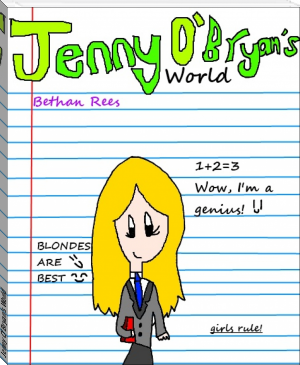The History and Records of the Elephant Club by Doesticks and Underhill (android based ebook reader TXT) 📗

- Author: Doesticks and Underhill
Book online «The History and Records of the Elephant Club by Doesticks and Underhill (android based ebook reader TXT) 📗». Author Doesticks and Underhill
Preparations had been made to secure the services of the biggest authors, the most notorious painters, the largest sized sculptors, the most melodious poets, and the most sanguinary editors the country could produce. The anxious world expected nothing less than to see the author of "Thanatopsis" appear as Hamlet in black-tights and a slouched hat—and he who invented "Evangeline" and "Hiawatha" come on as the Ghost with a pasteboard helmet and a horse-hair beard. Who should be Laertes but he who "skulped" the Greek Slave, or what editor could play "the king" like the democratic conductor of the Tribune? who, in assuming the crown, was[Pg 291] to doff the white hat, "positively for one night only?" The Queen of Denmark would of course be represented by the architect of "Uncle Tom's Cabin," whose familiarity with courts and royalty would enable her to invest the character with life-like interest. The public had made up its mind to be content with no Ophelia except Ruth Hall, for no one else could play the crazy scenes so admirably. But alas for the expectations of the misguided public—the illustrious individuals aforesaid would not come, and consequently the public were compelled to witness the consummation of the dreadful tragedy, by authors whose works they had never heard of; painters whose productions were unknown to the world, and editors whom a close investigation resolved into obscure scribblers.
To this literary exhibition Overdale, Wagstaff, and John Spout resolved to go—Overdale to give the necessary explanations, Wagstaff to make a transcript of his friend's valuable remarks, and John Spout (himself an amateur artist) to see the celebrated men of his own profession, whose contributions to art had been so persistently kept out of sight.
The performance was to take place in the Academy of Music, a building designed and completed by a[Pg 292] diabolically ingenious architect, who endeavored to construct a theatre in such a manner that one half the audience could not hear, and the other half could not see, and who succeeded to admiration.
Our friends obtained seats in that part of the house where they could see, though it was not possible to hear a word.
After a great many preliminary flourishes and false starts by the members of the orchestra, they set off as nearly together as they could, in obedience to the frantic gestures of the leader, who flourished his fiddle-bow with as much energy and vindictiveness as if he had been insanely endeavoring to kill mosquitoes with it, in forty different directions at once.
Finally the curtain went up amid the uproarious applause of the assembled multitude, interrupted only by a small boy in the gallery, who hissed like a whole flock of enraged wild-geese, having been stationed there especially for the performance of this sibilant duty by an avenging washerwoman, to whom one of the amateurs owed four and sixpence; his dissenting voice was, however, soon hushed by the police, who put him out, and didn't give him his money back, after which the exhibition proceeded.[Pg 293]
To give a full description of one half of the ridiculous performances indulged in by these deluded persons—to tell of the new readings which they gave, and the old readings which they didn't give—to relate how carefully they avoided the traps, and with what commendable caution they kept away from the footlights—to give an idea of the bedlamitish ingenuity they had displayed in the selection of wardrobe, how each one had put on the most inappropriate articles imaginable, and how they could not have been more incongruously attired if they had been all dressed in sheep's grey breeches and straw hats—to dilate upon the disasters which befell the said wardrobe, how the tunics caught in the wings, and the shoulder-cloaks got singed by the side-lights; how the ladies' trains were in everybody's way, and their feathers in everybody's eyes—how, in their confusion, when they painted their faces, they put the wrong colors in the wrong places, and some of them went on with white cheeks, chalked lips, and eyebrows colored a bright vermilion—how the gilt crowns got bent and battered until they looked like ancient milk-pans with the bottoms melted out—how the flannel ermine on the regal calico robes got greasy, and looked like tripe—how the wax pearls melted and the glass ones broke—how the "supes"[Pg 294] painted their whiskers uneven, and got their wigs on wrong side before—how some of them couldn't get their armor on at all, but how one enterprising individual, having succeeded to his satisfaction, came on to deliver a message, with his sandals in his hand, his helmet on one foot, his breast-plate on the other, and his leg-pieces strapped on his shoulders—to tell how the Ghost got chilly and played the last scene in an overcoat, and proved that he was a substantial Native American Ghost, by making two extemporaneous speeches, in excellent English, to the audience—to do full justice to the miscellaneous assortment of legs, then and there congregated, and relate how some were bow-legs, and some were shingle-legs, some were broomstick-legs, some were wiry legs, and some were shoulder-of-mutton legs—to give an accurate relation of the various expedients resorted to, to remedy the most noticeable defects in those legs, and state that some were padded on the sides, and some at the ankles, and how, in not a few instances, the padding slipped away from its original position, thereby putting the calves on the shins, and causing the knees to resemble deformed india-rubber foot-balls—and to give a reliable history of the unheard-of antics indulged in by the said fantastic legs, after their symmetry had been perfected by[Pg 295] the means just written—how some went crooked, some sideways, and some wouldn't go at all; how some minced with short steps, like a racking pony, and others stepped along as if they had seven-league boots on; how some moved with convulsive hitches, as if they were clockwork legs, and the springs were out of order; how some worked spasmodically up and down in the same place, and didn't get along at all, as if they were legs which had struck for higher wages; and how others dashed ahead, as if they did not intend to stop until they had transported their bewildered proprietors out of sight of the audience, as if they were machine legs, with the steam turned on, and weights on the safety-valve; how some went on the stage and wouldn't go off, and how others went off and wouldn't go on, until they were coaxed on by their agonized owners, a long time after the cue came—to tell how the red fire burned green, and the blue fire would not burn at all—how the call-boy got tipsy, and was not forthcoming—how the property-man fell over the sheet-iron thunder, and stuck his head into a pot of red paint, which made him look like a modern edition of Charles the First with his head cut off—how the grave-diggers got into the grave and couldn't get out—how Hamlet and Laertes could hardly get[Pg 296] in at all; and how, when they did get in, they made the gravel fly—how the wrong men came on at the wrong time, and how, as a general thing, the right men didn't ever come on—how Guildenstern spoke Ophelia's lines, how Horatio tried to speak one of Hamlet's speeches, and danced a frantic hornpipe with rage because he couldn't think how it began, and how Polonius couldn't speak at all, and so went home—how nobody could remember what Shakspeare said, and so everybody said what Shakspeare didn't say, and hadn't said, and wouldn't have said, under any circumstances—how some of the men swore, and some of the women wanted to, but postponed it, and how the butchery proceeded, with many mishaps and multitudinous mistakes, and how the audience applauded, and cheered, and laughed at the dismal tragedy, evidently considering it the liveliest farce of the season, are facts, falsehoods, and circumstances, both real and supposititious, which could not be compressed within the limits of a single volume.
Hamlet was personated by an aspiring youth, whose physical dimensions were not up to the army standard, and who couldn't have gathered fruit from a currant-bush without high-heeled boots on; while the lady who represented his mother would have[Pg 297] been compelled to stoop in order to pick pippins from the tallest apple-tree that ever grew. By the side of her illustrious son, she looked perfectly capable of taking him up in her arms, giving him his dinner after the usual maternal fashion, and afterwards disposing of him in the trundle-bed, to complete his infant slumbers.
Overdale explained that they had tried to get a bigger Hamlet, but that, upon the whole, he thought the little fellow would "speak his piece" pretty well, taking into consideration the fact, that in the dying groans, he was supposed to have no superior.
Wagstaff was totally ignorant of the plot, and as from the obfuscation of the performers, no one could have formed the slightest idea of what they were all talking about, he seemed in no very fair way to find out anything about it.
The peculiar rendition of the story of the King of Denmark was so uncertain, that even John Spout found it exceedingly difficult to tell where they were or how they would come out, or what they intended to do next. He was a little uncertain whether the queen would finally subdue Hamlet, or Hamlet succeed in thrashing the queen. In the closet scene, especially, the battle was conducted with such varying success that it was impossible to bet, with any[Pg 298] kind of certainty, on the result, or to prognosticate, with reliability, whether Hamlet would knock his mother down with a chair, and damage her maternal countenance with the heels of his boots, or whether the old lady would succeed in her design, which was evidently to conquer her rebellious offspring, and give him a good spanking. Neither could he tell whether Laertes would kill Horatio, Hamlet, or the Second Grave-digger, who stood behind the wing, with his hands in his pockets, and his breeches in his boots. He was also a little undecided as to which was Polonius, and which was the king, and when the player queen came on, he thought it was only Ophelia, with a different-colored petticoat on. John swore the Ghost looked as if he hadn't had any dinner, and said he was perfectly certain his ghostship had been refreshing his invisible bowels with a mug of ale, behind the scenes, because when he came on the last time, with the broomstick in his hand, he could see the foam on his whiskers.
One of the richest and most incomprehensible scenes ever witnessed on the modern stage was the final one between Hamlet and the Ghost, who, finding the weather chilly, had done his best to mitigate his sufferings by putting on an overcoat. Hamlet, trying to look fierce, holding his sword at arm's[Pg 299] length, performing a kind of original fancy-dance, as he followed the spiritual remains of his ghostly father across the stage—Hamlet, the mortal, being about the size of a mutton-ham, while his father, the immortal, supposed to be exceedingly ethereal, was tall enough and stout enough for a professional coal-heaver, instead of an amateur ghost—the intangible spirit, moreover, having one hand in his overcoat pocket, to keep his fingers warm, while in the other he flourished a short broomstick, as if to keep his degenerate scion at a respectful distance, were so ludicrous, that John Spout seized Wagstaff's book, and produced the sketch to be found at the beginning of this chapter.
And in the last death-scene Hamlet really won such honors as were never before accorded to mortal tragedian; being by this time a little doubtful whom to kill, he made an end of the entire company in rotation. First, he stabbed the King, who rolled over once or twice, and died with his legs so tangled up in the Queen's train that she had to expire in a hard knot; then he stabbed Laertes, who died cross-legged; then he stabbed Osric; and not content with this, he tripped up his heels and stood on his stomach, till he died in an agony of indigestion; then he tried to stick Horatio, but only succeeded in knocking[Pg 300] his wig off; and then, turning up stage, made extensive preparations for terminating his own existence.
First, as everybody was dead, and everybody's legs were lying round loose, he had to lay them out of the way carefully, so as not to interfere with the comfort of the corpses; then he picked up all the swords and laid them cautiously in a corner, so that the points shouldn't stick in him when he fell; then he looked up at the curtain to see that





Comments (0)